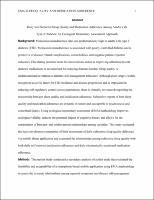Please use this identifier to cite or link to this item:
https://hdl.handle.net/20.500.12202/8419| Title: | Daily Self-Reported Sleep Quality and Medication Adherence Among Adults with Type 2 Diabetes: An Ecological Momentary Assessment Approach |
| Authors: | Gonzalez, Jeffrey S. Seng, Elizabeth K. Weinberger, Andrea H. Solon, Carly A. |
| Keywords: | Clinical psychology |
| Issue Date: | Jul-2022 |
| Publisher: | Yeshiva University |
| Citation: | Solon, C.A. (2022, July). Daily Self-Reported Sleep Quality and Medication Adherence Among Adults with Type 2 Diabetes: An Ecological Momentary Assessment Approach (Publication No. 29390688) [Doctoral dissertation, Yeshiva University]. PDTG. |
| Series/Report no.: | Ferkauf Doctoral Dissertations;Publication No. 29390688 |
| Abstract: | Background: Medication nonadherence rates are problematically high in adults with type 2 diabetes (T2D). Medication nonadherence is associated with poorly controlled diabetes and is predictive of disease related complications, comorbidities, and negative patient-reported outcomes. Elucidating potential areas for interventions aimed at improving adherence to oral diabetes medications is an important for reducing diabetes burden. Sleep quality is underexamined in relation to diabetes self-management behaviors. Although poor sleep is widely recognized as a risk factor for T2D incidence and disease progression and is implicated in reducing self-regulatory control across populations, there is virtually no research exploring the relationship between sleep quality and medication adherence. Subjective reports of both sleep quality and medication adherence are dynamic in nature and susceptible to psychosocial and contextual factors. Using ecological momentary assessment (EMA) methodology improves ecological validity, reduces the potential impact of cognitive biases, and allows for the examination of between- and within-person relationships among variables. This study evaluated the basic psychometric properties of brief assessment of daily subjective sleep quality delivered via mobile phone application and examined the relationships among subjective sleep quality with both daily self-reported medication adherence and daily electronically monitored medication adherence. ¶Methods: The present study conducted a secondary analysis of a pilot study that evaluated the feasibility and acceptability of a smartphone-based mobile application using EMA methodology to assess the dynamic relationships among reported symptoms and disease self-management behaviors. Participants were 61 adults with T2D (N = 61; Age = 55.4 (9.9 years); Women = 63.9%; Black = 61%; Latino = 36%; HbA1c = 8.6(2.3)). Data on subjective sleep quality were collected once daily in the morning over a 14-day EMA study period. The Pittsburgh Sleep Quality Index (PSQI) was used to assess retrospective recall of sleep quality and was collected at the follow up lab visit. The basic psychometric properties of a 5-item EMA self-reported sleep quality scale were evaluated. Daily self-reported (SR) medication adherence was measured using a single item that was administered as part of the evening survey administered once daily during the EMA study period, and electronically monitored adherence was captured using Medication Event Monitoring System (MEMS) electronic bottle caps. Multilevel logistic models (MLM) were conducted to evaluate between- and within-person relationships and the role of intraindividual variability in subjective sleep quality and both self-reported and electronically monitored medication adherence¶Results: Analyses revealed that the 5-item EMA sleep quality measure had good internal consistency (α = .86) and strong convergent validity with the PSQI global score (ρ = .69, <.001). Participants had 28% decreased odds of self-reporting ‘excellent’ medication adherence for every one-unit increase in average daily sleep quality, where higher scores on the sleep quality measure indicated worse sleep quality (OR = 0.72, p = .006, 95% CI = [0.57, 0.91]). There was no significant between-person effect of average sleep quality on MEMS adherence. There was no significant within-person effect where sleep quality was associated with adherence at the day level on either self-reported or electronically monitored medication adherence. There was also no significant effect of intra-individual variability in sleep quality on SR medication adherence or MEMS adherence; participants with greater overall variability in sleep quality across the study period did not differ significantly in their self-reported or electronically monitored medication adherence. Results indicated that self-reported adherence differed significantly from electronically monitored adherence. Chi square test indicated that MEMS adherence was not significantly associated with SR adherence in our sample (p = .284, two-tailed Fisher’s Exact Test). A sensitivity and specificity analysis yielded findings of high sensitivity for ‘excellent’ SR Adherence in reference to ‘perfect’ MEMS adherence 72.3% (384/531), but low specificity 48.8% (53/121). ¶Discussion: Results showed that the 5-item EMA sleep quality measure had good basic psychometric properties. Our findings lend support for the use of this measure in future EMA studies in a racially diverse, socioeconomically disadvantaged, T2D population. Results also indicated that participants who had better sleep quality on average had greater odds of reporting that they had excellent adherence to their medication, but when someone had a night of better or worse sleep quality than they usually did, there was no influence on their odds of reporting whether they took their medication on the subsequent day. There was no observed relationship between subjective sleep quality and the odds of MEMS adherence. Results also indicated that there was no link between whether participants had consistent sleep quality and their odds of medication adherence. These findings contribute to a foundational understanding of dynamics among sleep quality and medication adherence in this population. The current study’s findings provide preliminary support for integrating education on sleep quality into diabetes treatment and highlight the necessity of further research examining dynamics among sleep and medication adherence. |
| Description: | Doctoral dissertation, PhD / Open Access |
| URI: | https://hdl.handle.net/20.500.12202/8419 https://ezproxy.yu.edu/login?url=https://www.proquest.com/dissertations-theses/daily-self-reported-sleep-quality-medication/docview/2721765295/se-2?accountid=15178 |
| ISBN: | 9798351444840 |
| Appears in Collections: | Ferkauf Graduate School of Psychology: Doctoral Dissertations |
Files in This Item:
| File | Description | Size | Format | |
|---|---|---|---|---|
| Solon Dissertation Document Final 8.6.22 OA.pdf | 1.27 MB | Adobe PDF |  View/Open |
This item is licensed under a Creative Commons License

